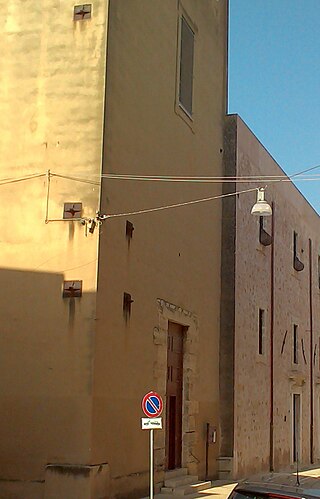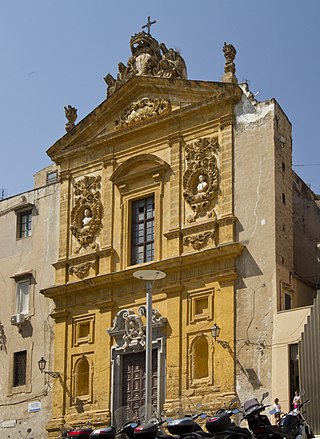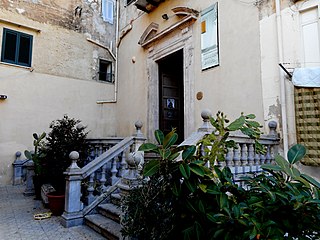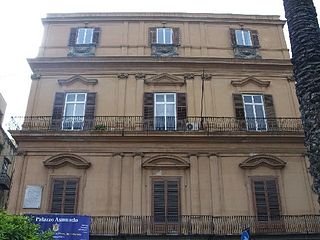
San Giuseppe dei Teatini is a Roman Catholic church on via Vittorio Emanuele, at the southwest corner of the Quattro Canti, in the historic center of the city of Palermo, region of Sicily, Italy. The east flank of the nave faces the Fontana Pretoria, across the piazza from Santa Caterina. San Giuseppe is an example of the Sicilian Baroque in Palermo.

Giacomo Serpotta was an Italian sculptor, active in a Rococo style and mainly working in stucco.

The Church of the Gesù, known also as the Saint Mary of Jesus or the Casa Professa, is a Baroque-style, Roman Catholic church established under the patronage of the Jesuit order, and located at Piazza Casa Professa 21 in Palermo, region of Sicily, Italy.

The Church of Saint Mary of Pity is a Baroque church of Palermo. It is located at the corner of Via Alloro and Via Torremuzza in the quarter of the Kalsa, within the historic centre of Palermo.

The Church of Saint Ursula of the Blacks is a Baroque-style, Roman Catholic church located in the central Via Maqueda #110, adjacent to the Palazzo Comitini, in the quarter of the Albergaria, within the historic centre of Palermo, Region of Sicily, Italy.

Santa Caterina d'Alessandria or Saint Catherine of Alexandria is a Roman Catholic church with a main facade on Piazza Bellini, and a lateral Western facade facing the elaborate Fontana Pretoria, in the historic quarter of Kalsa in the city of Palermo, region of Sicily, Italy. In front of the main facade, across the piazza Bellini, rise the older churches of San Cataldo and Santa Maria dell'Ammiraglio, while across Piazza Pretoria is the Theatine church of San Giuseppe and the entrance to the Quattro Canti. Refurbished over the centuries, the church retains elements and decorations from the Renaissance, Baroque, and late-Baroque (Rococo) eras. This church is distinct from the Oratorio di Santa Caterina found in the Olivella neighborhood.

The Church of Saint Nympha is a Baroque-Mannerist church of Palermo. The facade rises on Via Maqueda, a block north of the central intersection known as the Quattro Canti, in the quarter of Seralcadi, within the historic centre of Palermo. The church belongs to the Camillians.

Badia Nuova is a Catholic church located in Alcamo, in the province of Trapani, Sicily, southern Italy.

The Church of Most Holy Saviour is a Baroque-style, Roman Catholic church in Palermo, Italy. It is located at #396 of the ancient main street of Palermo, the Cassaro, presently Via Vittorio Emanuele, in the ancient Albergaria quarter.

The Church of Saint Teresa is a Baroque Roman Catholic church, located on Piazza della Kalsa, facing the Porta de Greci in the ancient quarter of the Kalsa of the city of Palermo, region of Sicily, Italy.

The Palazzo Alliata di Villafranca is former aristocratic mansion, now converted into a museum, located just off Via Vittorio Emanuele facing the Piazza Bologni which opens two blocks west of the Quattro Canti intersection, in the ancient quarter of the Albergaria of the city of Palermo, region of Sicily, Italy.

Sant'Agata al Collegio is a Roman Catholic church building at the end of Corso Umberto, intersection with via Re D'Italia, in the town of Caltanissetta, in the province of same name, Sicily.

San Stanislao Kostka is a Roman Catholic parish church located on 24 Via del Noviziato in the city of Palermo, region of Sicily, Italy.

San Giorgio in Kemonia, some decades ago renamed as San Giuseppe Cafasso, is a Roman Catholic parish church located on Via dei Benedettini #13 in the city of Palermo, region of Sicily, Italy. In 1953, the church was rededicated to Joseph Cafasso (1811-1860), patron saint of prisoners, due to former nearby female prison. The apse of the ancient church of San Giovanni degli Eremiti ends on the right flank of the church. Across the street are a series of building forming the Giovanni di Cristina Children's Hospital.

The San Giovanni dei Napoletani (English: St John of the Neapolitans is a late-Baroque or neoclassical church of Palermo. It is located in the quarter of Kalsa of the historic centre of Palermo. It is located diagonally in front of the church of Santa Maria della Catena.

The Oratorio di San Mercurio is a Baroque chapel or prayer room located adjacent to the former Benedictine convent and church of San Giovanni degli Eremiti, in the quarter of the Albergaria, within the historic centre of Palermo, region of Sicily, Italy.

The Oratorio del Rosario di Santa Cita is a Baroque chapel or prayer room located in the quarter of the Castellamare within the historic center of Palermo, region of Sicily, Italy. The site is best known for the remarkable stucco tableaux scenes composed during 1687-1718 by Giacomo Serpotta.

Santa Cita, reconsecrated in 1952 as San Mamiliano, is a baroque-style, Roman Catholic parish church located on Via Squarcialupo, 1, in the quarter of Castellammare of the city of Palermo, Sicily, Italy. The church and its artworks suffered heavily the bombardment during the Second World War, but it still contains original works and is attached to the Oratory of the Rosary of Santa Cita and less than a block north of the church of Santa Maria di Valverde.

The Oratory of Saint Catherine of Alexandria is a Baroque oratory located attached to the church of Sant'Ignazio all'Olivella, in the quarter of the Castellammare of Palermo, region of Sicily, Italy.

The Palazzo Asmundo is a late-Baroque aristocratic residence located on via Vittorio Emanuele, corner Via Pietro Novelli #3, in central Palermo, region of Sicily, Italy. The palace front faces the piazza and garden on the south flank of the Cathedral of Palermo. The privately owned palace is presently a museum and exhibition space.





















